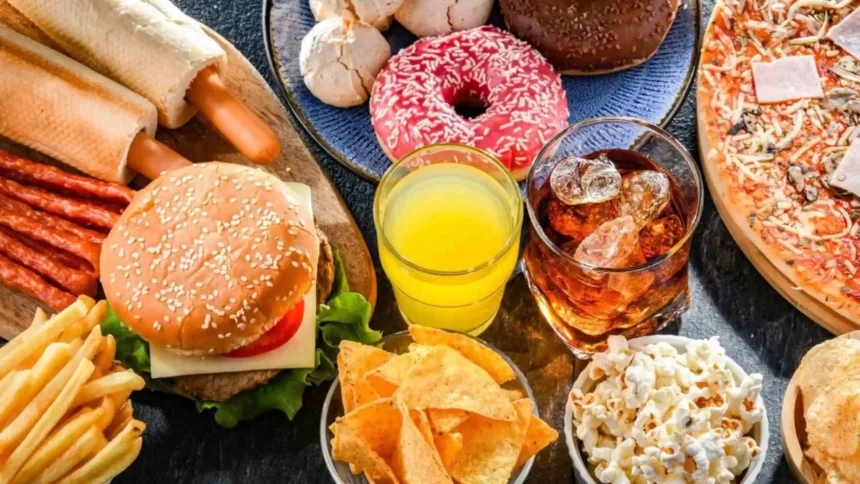In a remarkable 30-year study published in BMJ, researchers identified an intriguing link between processed food consumption and an increased risk of dying young. The study, which included over 100,000 health professionals from the Nurses’ Health Study and the Health Professionals Follow-up Study, discovered that a high intake of ultra-processed foods, such as ready-to-eat meals and sweet drinks, was associated with a higher risk of death, both cause and total. Despite its limitations, the study’s findings underscore the importance of limiting processed food consumption for long-term health advantages.
What is Ultra-Processed Food?
Ultra-processed foods are industrial foods created mostly from food and other materials. The most common examples are packaged baked products and sugary cereals. They also include carbonated beverages and ready-to-eat or ready-to-heat foods. These items generally contain artificial colors, flavors, emulsifiers, and preservatives. They often provide the necessary energy in addition to sugar, saturated fats, and sodium, but lack vital vitamins, fiber, and proteins.
Research Summary
To better know the link between food processed in ultra-high quantities and the risk of death, scientists looked at data spanning three decades and came from two large groups:
- Nurses’ Health Survey (1984-2018) included 74,563 female nurses registered with 11 U.S. States.
- Health Professions Follow-up Studies (1986-2018) comprised 39.501 male health experts across 50 states.
Participants were given regular health and lifestyle updates and completed an annual diet questionnaire over four years.
The Key Findings of Study:
- Over 34 years, 48,193 people died. This comprised 13,557 cancer deaths, 11,416 cardiovascular disorders, 3,926 respiratory diseases, and 6,343 neurological diseases.
- The most high-risk quartile of food consumption that is highly processed (average seven meals per day) had an increase of 4% of death from any cause and a 9% higher likelihood of dying from all reasons contrasted to those in the lower quartile (average three meals daily).
- The most robust connections with mortality were those resulting from neurodegenerative diseases (8 percent greater risk) and other causes of death (9% greater risk).
Categorization of Risks:
Risk classification based on the data, researchers concluded mortality risk associated with ultra-processed foods varied across specific categories:
- Meat, Poultry, and seafood-based items: Ready-to-eat items like processed meats showed the strongest and most consistent links to increased mortality.
- Drinks that are sweet and artificially sweetened: Consumption of sodas and beverages that are artificially sweetened has been linked to a higher risk of death.
- Dairy-based desserts and ultra-processed breakfast foods: Ice creams, sugary cereals, and other breakfast products also showed strong associations.
Impact of Dietary Quality:
The effect of diet quality When the nutritional quality of the diet was considered, the links between the Consumption of processed foods and the risk of mortality could have been much more significant. It is possible that having a balanced diet can help mitigate some of the negative consequences of processed food.
Observational Study Limitations:
Despite findings based on evidence, the observational approach had some limitations that were inherent to the study:
Classification Complexity: The complexity of classification. The heavily refined food classification system could fail to understand the intricate nature of food processing, leading to inaccurate classification.
Participants’ Demographics: Most participants were white. Those who are health conscious hindered the generalization of results.
Specific suggestions
The researchers cautioned against the blanket ban on any ultra-processed food. However, their findings suggest restricting certain kinds of foods to improve the long-term health of individuals:
- Reduce your intake of ready-to-eat seafood and meat products. Instead of refined options, choose fresh, lean meats and plant-based proteins.
- Beware of drinking too much sweetened or artificially sweetened drinks: Replace sweet drinks with diluted herbal teas, water, or natural juices.
- Reduces the dairy-based Desserts: Switch the yogurt sweetened with sugar and ice cream for fresh fruits or nuts.
- Select the Whole Breakfast: Choose whole cereals and fresh fruits over sweet cereals.
Contradictory Findings:
The study’s results are contradictory: It does not show any significant link between processed foods and deaths from cardiovascular, cancer, or respiratory diseases, thereby challenging the validity of some prior notions. This gap underscores the importance of dietary impacts on health.
Improved Food Classification Systems
Researchers have highlighted the need for more sophisticated classification of food systems that can accurately capture the subtleties of ultra-processed food processing. This will improve understanding and evaluation of health risks associated with specific food items.
Healthy Alternatives for Health
To reduce the dependence on processed foods, Look at these more nutritious options:
- Making your food involves creating dishes using fresh, whole ingredients, ensuring no oversight over adding additives or preservatives.
- Replace your snack foods with fruits or vegetables and homemade energy bars.
- Swap more refined breads and grains for wholegrain alternatives.
- Herbs, teas, or coconut water instead of sweet beverages.
Future Research Directions
The following research should be conducted to enhance understanding and verify these findings.
- Improve the diversity of participants to improve the generalizability.
- Enhance the classification of processed food items for more accurate information.
- Examine the interplay between processed food and the nutritional quality of your food.
Conclusion
This crucial research offers essential insight into the health risks associated with eating foods processed to a great extent. While some ultra-processed foods are subject to strict restrictions, limiting the Consumption of ready-to-eat foods, as well as sugary drinks and dairy-based desserts, can help keep your health in good shape for the long term. As a result, paying attention to nutrition and health and making healthier food choices can significantly decrease the risk of dying young.


Leave a Reply